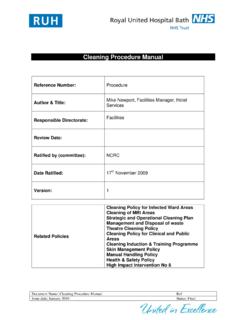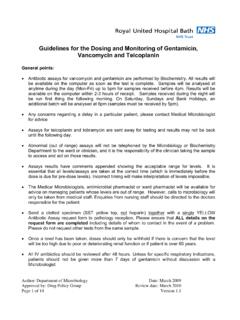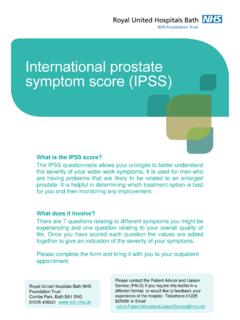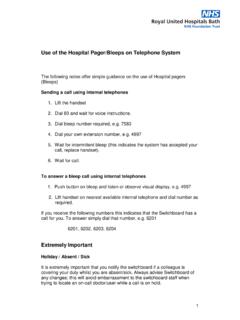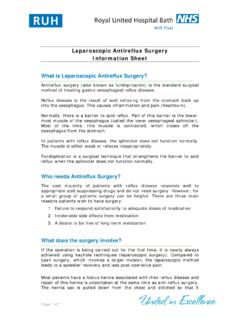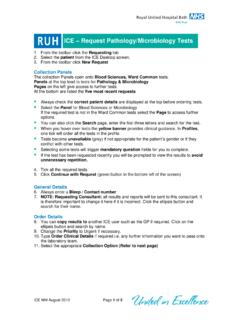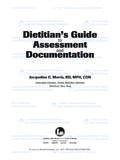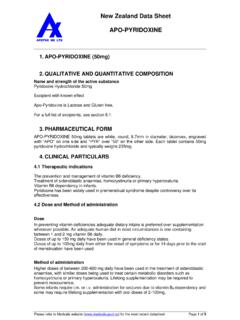Transcription of Information for Clinicians - Royal United Hospital
1 Date of Issue: Author: Drs CJC Knechtli & JN Crowe Review Date: Approved by: Last Updeted: Royal United Hospital Bath NHS Trust Page 1 of 6 Guidelines for the Investigation & Management of vitamin B12 deficiency Background We frequently get asked for advice on the cause of a patient s vitamin B12 (cobalamin) deficiency and its management. For the patients with a very low serum B12 level (<100ng/l) and anaemia, macrocytosis or neurological symptoms, the treatment is simple: load the patient with vitamin B12 parenterally (by IM injection) and continue with maintenance vitamin B12 by IM injection every 3 months indefinitely (see below for more details). The cause of the vitamin B12 deficiency may be more difficult to define but this guideline should help you to find a cause in the majority of these more serious cases.
2 This document is designed not just to provide guidance on a management plan for these patients but also to provide some background Information to support better understanding of the issues involved. However, if you are in a rush, please go straight to the suggested management algorithm on page 5. Requests for serum vitamin B12 levels continue to rise. The RUH performed 35,400 vitamin B12 measurements in 2010 compared with 18,400 in 2006. Many of these tests are requested in the absence of any haematological, neurological or gastrointestinal problems. Such asymptomatic patients usually have moderately or mildly low vitamin B12 levels of 150-180ng/l. In this situation, it is common not to find a cause for the vitamin B12 deficiency which makes it difficult to know how best to manage the patient.
3 Presentation Sources of dietary vitamin B12 Vitamin B12 is found in foods of animal origin including milk, cheese, yoghurt and eggs. Vitamin B12 deficiency of dietary origin is therefore only found in strict vegans. The recommended daily requirement of vitamin B12 is small (1-2 g/day) compared with total body stores (2000-5000 g) much of which is stored in the liver. This explains why it takes a long time, usually years, for vitamin B12 deficiency to develop. Vitamin B12 absorption Dietary vitamin B12 is freed from the food protein by pepsin in the acid gastric environment and binds to haptocorrin, a protein secreted in saliva. In the small intestine, haptocorrin is degraded by pancreatic enzymes, the vitamin B12 is released and binds with intrinsic factor (IF), itself Information for Clinicians Date of Issue: Author: Drs CJC Knechtli & JN Crowe Review Date: Approved by: Last Updeted: Royal United Hospital Bath NHS Trust Page 2 of 6 secreted by gastric parietal cells.
4 The IF-B12 complex is carried through the small intestine and binds to receptors in the terminal ileum where it is actively absorbed. A small fraction (1-2%) of the daily intake is passively absorbed across the entire absorptive surface of the intestinal tract. Indications for measuring serum vitamin B12 level Haematological (in increasing order of severity) o Isolated red cell macrocytosis o Macrocytic anaemia (esp. if MCV >110fl) o Pancytopenia (esp. if MCV >120fl) Neurological or psychiatric o Peripheral neuropathy o Cognitive change dementia o Optic neuritis Gastrointestinal o Investigation of possible malabsorptive process Other (rare) o Angular cheilosis o Sore beefy red tongue Haematological complications of vitamin B12 deficiency can present in the absence of neurological problems and vice versa.
5 Causes of vitamin B12 deficiency Inadequate vitamin B12 in diet o Strict vegan Oral contraceptive pill o The reduced serum B12 level is thought to be due to a reduction in the level of the vitamin B12-carrying protein (transcobalamin) rather than a deficiency of vitamin B12 per se. Vitamin B12 malabsorption o Pernicious anaemia (PA) Caused by loss of gastric parietal cells due to autoimmune atrophic gastritis resulting in reduced IF production Commonly associated with other autoimmune conditions (esp. vitiligo and thyroid disease) and slightly increased risk of gastric carcinoma. Familial tendency o Long term use of PPI or H2-antagonist drugs o Chronic alcoholism o Pancreatic failure o Coeliac disease this much more commonly causes iron and/or folate deficiency but 10-30% of coeliac patients can have evidence of vitamin B12 deficiency o Gastrectomy o Small bowel (esp.)
6 Terminal ileal) surgery o Generalised malabsorption tropical sprue Date of Issue: Author: Drs CJC Knechtli & JN Crowe Review Date: Approved by: Last Updeted: Royal United Hospital Bath NHS Trust Page 3 of 6 o Inflammatory bowel disease esp. that affecting the terminal ileum Crohn s disease o Blind loop syndrome and/or small bowel bacterial overgrowth bacteria compete for and break down IF-B12 complex o Drugs Biguanide ( Metformin) therapy (inhibits vitamin B12 absorption) Cholestyramine Slow K o Fish tapeworm (Diphyllobothrium latum) infestation Mostly seen in Scandinavia where eating raw fish is more common practice Rarities o Nitrous oxide (N2O) cob(I)alamin oxidised to cob(III)
7 Alamin o Deficient/defective IF o Disorders of cobalamin transport defective transcobalamin II or TC II receptor o Inborn errors of metabolism A careful history concentrating on the patient s diet, drug therapy and previous medical history is therefore important in elucidating the cause of vitamin B12 deficiency. Other features such as a family history and signs of autoimmune disorders (esp. thyroid disease and vitiligo) may point towards a diagnosis of pernicious anaemia. Differential diagnosis of a macrocytosis (MCV >100fl) In almost all of these cases the condition causes macrocytosis by inhibiting cell division of the red cell precursors in the bone marrow less cell division gives rise to larger red cells. Alcohol and/or liver disease (esp.)
8 If macrocytosis accompanied by thrombocytopenia but no or only mild anaemia) Vitamin B12/folate deficiency Pregnancy and newborn Hypothyroidism Haemolytic anaemia (where macrocytosis results from the presence of increased numbers of reticulocytes, which are larger than mature red cells, in the blood) Myelodysplasia Drugs esp anti-metabolites that interfere with DNA synthesis and cell division o Hydroxycarbamide o Azathioprine o Methotrexate o Trimethoprim o Zidovudine (AZT) and other nucleoside reverse transcriptase inhibitor treatments for HIV Aplastic anaemia or other causes of bone marrow stress Acquired sideroblastic anaemia (very rare) Investigations to help define the cause of the vitamin B12 deficiency Date of Issue: Author: Drs CJC Knechtli & JN Crowe Review Date: Approved by: Last Updeted: Royal United Hospital Bath NHS Trust Page 4 of 6 Anti-intrinsic factor (anti-IF) antibodies highly specific (95-100%) for PA but not very sensitive (only positive in 50-60% of patients with PA) Anti-gastric parietal cell (anti-GPC) antibodies reasonably sensitive (80-90%) for PA but not as specific as anti-IF antibodies this is one of the tests that make up the autoimmune screen.
9 NB A positive anti-GPC and/or anti-IF antibody test does not require repeating - this practice is a waste of resource. Thyroid function tests and anti-thyroid antibodies Test for celiac disease o Tissue transglutaminase (tTG) Tests for generalised malabsorption (if symptoms are suggestive) we suggest that the faecal tests are only requested by a Gastroenterologist o Serum calcium and vitamin D folate ferritin o Faecal fats elastase Schilling test o This is designed to provide objective evidence of some form of vitamin B12 malabsorption (part 1) and whether it corrects with the additional of oral IF (part 2) or after a course of antibiotic therapy (part 3). o The test is expensive and the radioactively-labelled cobalamin is now difficult to source.
10 It is therefore only very rarely performed these days. o In practice, in an audit performed by our laboratory in the early 2000s, almost all patients with a serum vitamin B12 <100ng/l had evidence of vitamin B12 malabsorption whilst virtually none of the patients with serum vitamin B12 >150ng/l did. Management of vitamin B12 deficiency In general, patients presenting with significant haematological and/or neurological consequences need to be treated promptly and effectively with vitamin B12 replacement via the parenteral route the effectiveness of oral therapy might be compromised if a malabsorptive condition is the cause of the deficiency. The management of patients with apparently asymptomatic vitamin B12 deficiency is a source of considerable debate.
